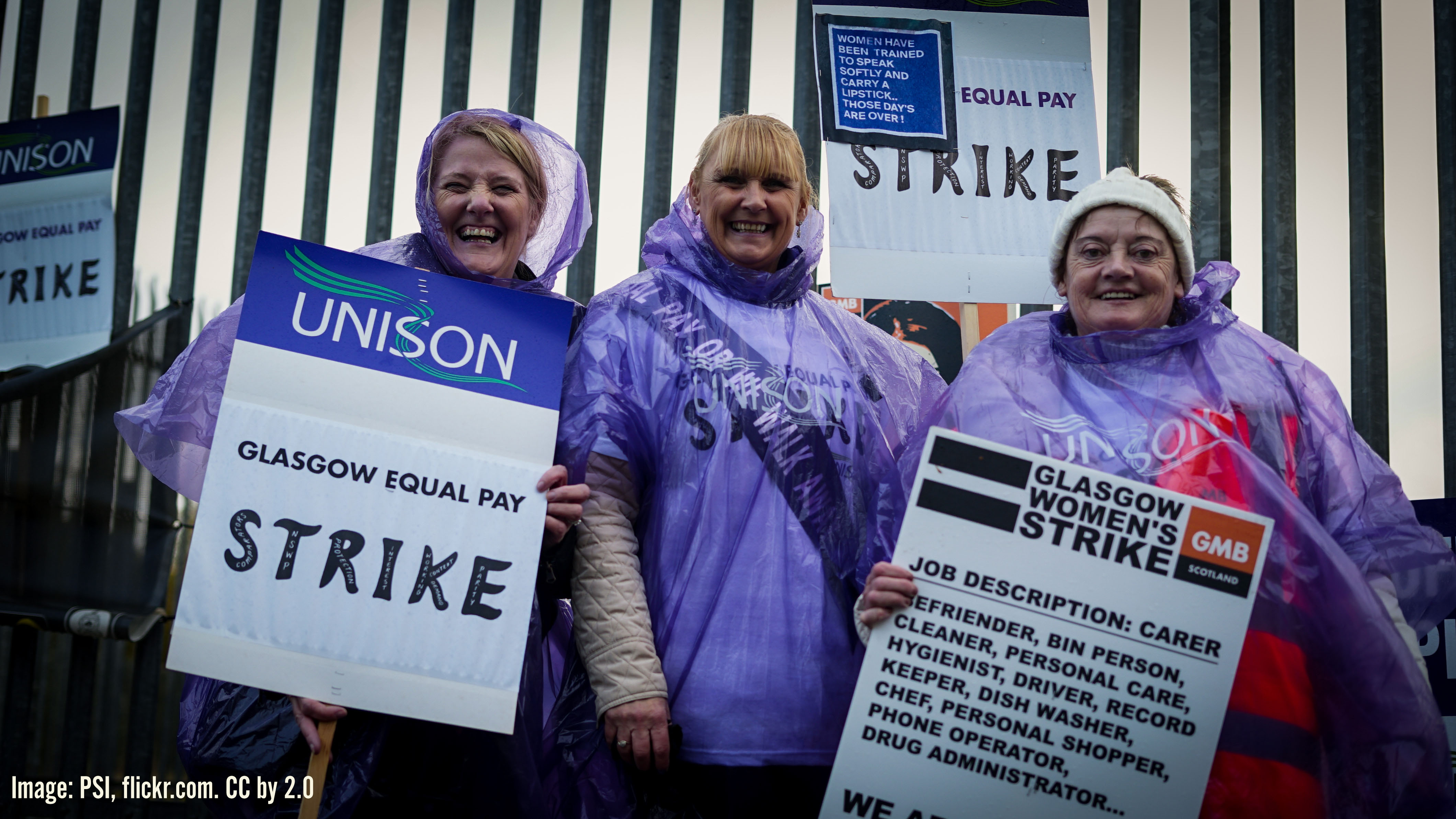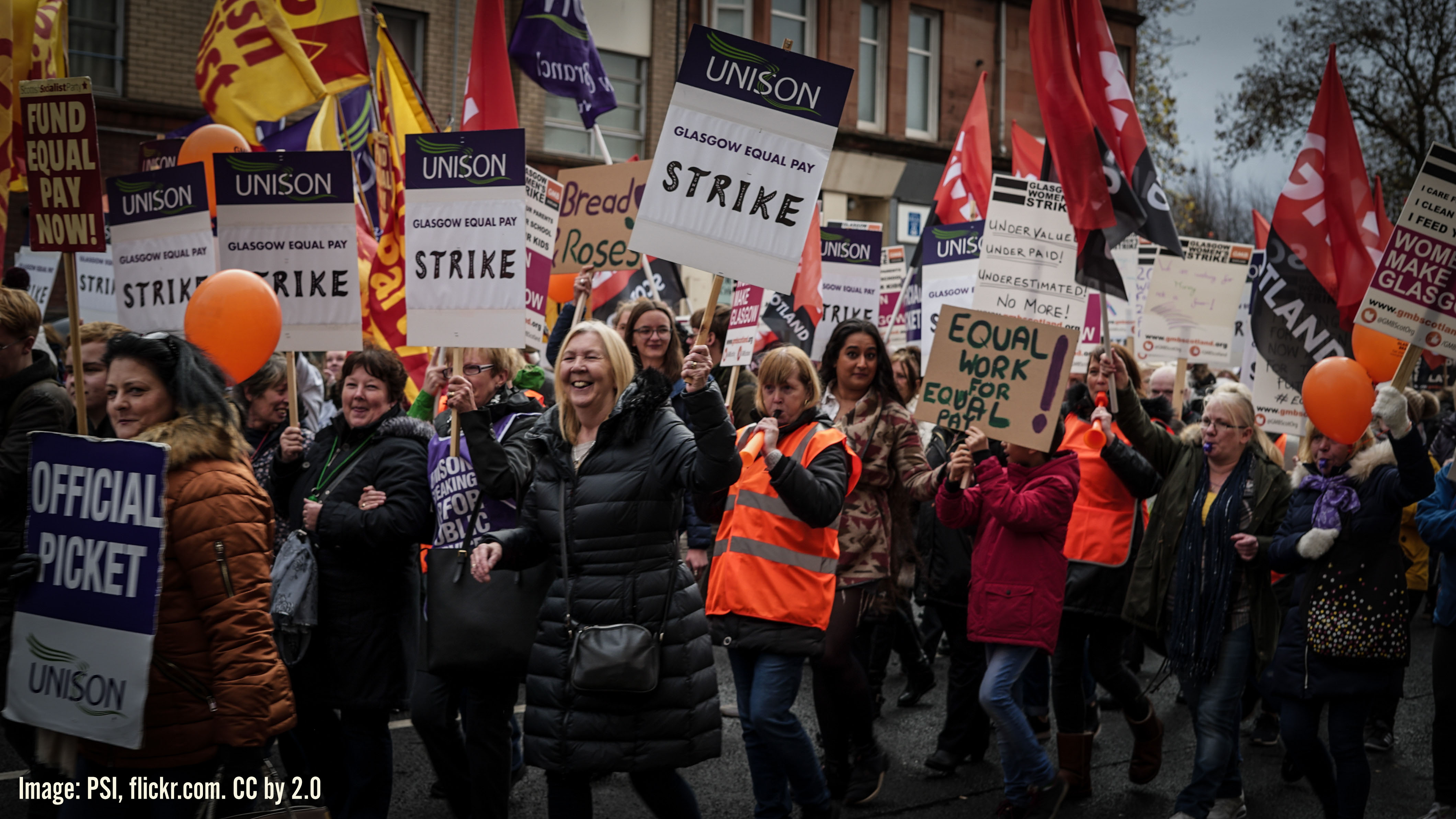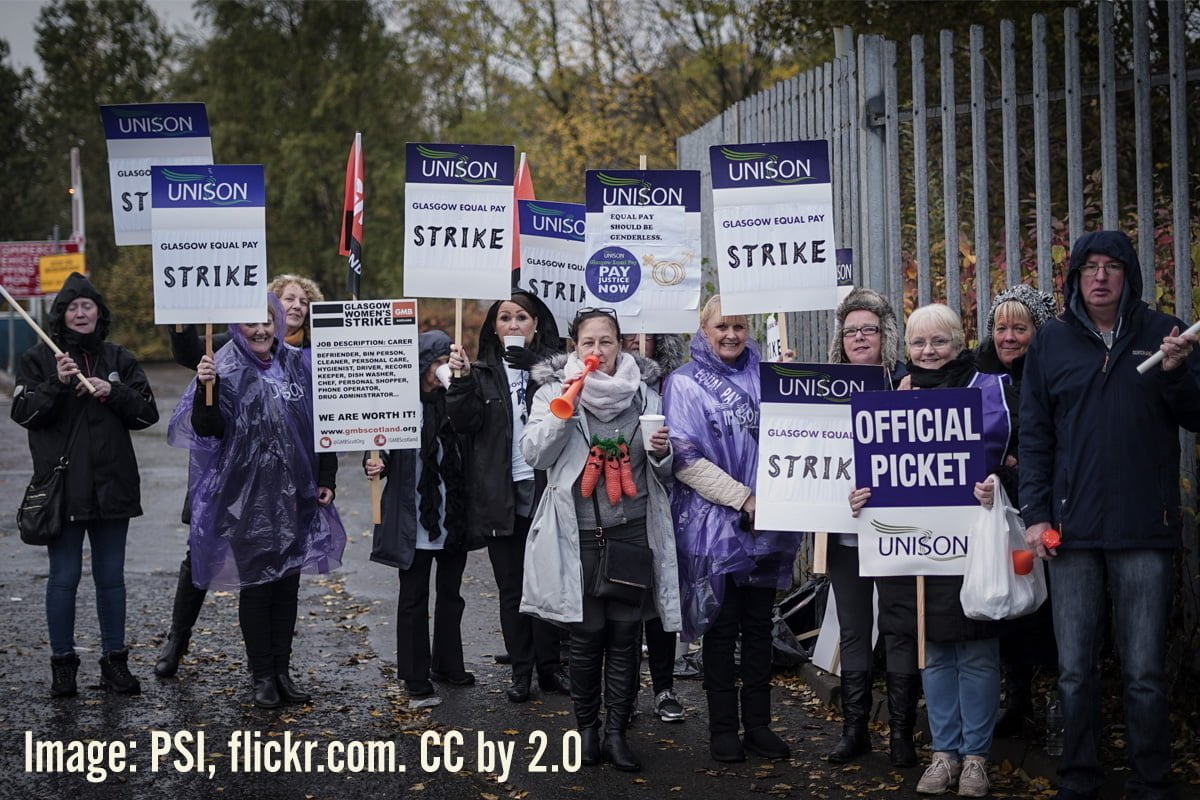World leaders assembling in Glasgow for the latest UN climate summit will be met with a wave of strikes by the city’s workers, who are protesting over pay and services. This militant action shows who really has the power to transform society.
Glasgow is set to grind to a standstill as COP26 – the latest UN Climate Change Conference – begins this weekend.
This year’s fortnight-long international summit will coincide with strike action from thousands of workers, school staff, and refuse collectors. Such action will show in practice that it is the working class that really holds the power in society – and not the world leaders and big business representatives at COP26.
The Scottish government and Glasgow City Council are blaming striking workers for disrupting the conference. But at the same time, they are imposing closures on roads, schools, museums, and libraries that cause great disruption to the lives of the city’s residents.
Council workers

The main industrial action during COP26 will be that of 1,500 council workers, including bin collectors and school janitors, who are due to strike between 1-8 November, following a 96.9% vote in favour of industrial action.
Last year, these same workers were hailed as ‘key workers’ and ‘heroes’. But such praise rings hollow now, with local government association COSLA proving to be far less generous in pay negotiations.
Talks fell apart after COSLA’s offer of an extra £850 a year – £6.50 a week after tax – was rejected. Instead, the unions representing local government workers (GMB, Unite, and Unison) are holding out for a real increase of £2,000.
Glasgow’s waste management services have been at war with the council for months now, as an unsanitary crisis engulfs the city. Complaints of piling rubbish, fly-tipping, and vermin have been met with flat denial by council leader Susan Aitken.
According to her, the city just needs a quick “spruce up”. And if people don’t like rubbish lying in their streets, then they have only their neighbours to blame!
The council’s purely punitive approach of increasing fines for fly-tipping, and ridiculously signposting piles of rubbish as an ‘environmental crime scene’, are clearly not going to work.
The GMB have hit back. Alongside tenants union Living Rent, GMB says that the city’s cleansing, refuse and recycling services badly need investment in order to rescue communities from growing slum-like conditions.
? What a show of strength from @Glasgow_LR members and @GMBGlasgowCC cleansing workers out today ?
Our demands ahead of COP26 – Glasgow needs long term investment, not a ‘spruce up’. Susan Aitken, the time has come to negotiate!
Will you meet with Living Rent & the GMB? pic.twitter.com/IKtMTe9Ttu
— Living Rent Glasgow (@Glasgow_LR) October 23, 2021
Lawyers boycott
Unfortunately for the Scottish government, this mood of resistance is spreading. A high number of arrests are expected at COP26 protests – estimated to hit as much as 300 per day. As a result, the government has planned to keep custody courts open all weekend in Glasgow, Edinburgh, and Aberdeen in order to charge protestors.
Bar associations across the three cities are set to boycott these kangaroo courts, however, causing further disruption, with Hamilton and Falkirk bar associations now also set to join them.
These lawyers cite cuts to legal aid leading to poor pay and overwork. According to Fiona McKinnon, president of the Glasgow Bar Association: “Legal aid practitioners are under pressure as they have been at no time before in living memory.”
Planning to burden them with additional cases – and only revealing their plans to do so two weeks in advance – is the final straw for these lawyers. The Scottish state has shot itself in the foot, with chaos in the courts on top of everything else.
Shutdown

While the council denies cost-of-living pay increases to some of its lowest-paid workers, it has also been inflicting cuts to jobs and public services. Dozens of community venues – including libraries and museums – are being shuttered across the city.
Even here, the council leaders lie through their teeth, denying that there are closures, saying that libraries are simply “not re-opening” after the COVID lockdowns, and asserting that services are being moved elsewhere.
Now public services are effectively being subverted to the interests of the COP26 conference. Large sections along the Clyde have been surrounded by a ring of steel fences and surveillance cameras to seal off the world’s leaders from the real conditions in the city.
Main roads like the Clyde Expressway have been closed, causing congestion and longer car journeys for people going to work – not exactly the sustainable image the council is trying to promote.
Several schools within or next to the exclusion zone will also be closed for two days, forcing many parents to take time off work. Museums like the Kelvingrove Art Gallery and the Gallery of Modern Art will also be closed for the duration of the conference, as Glasgow City Council redirects its workers to act as support staff for COP26.
And as if all this was not enough of an imposition on the people of Glasgow, for the sake of COP26, it has also been suggested there may have to be stringent COVID measures introduced across the city if there is a spike in cases following the conference.
Transport
Alongside the action mentioned above, railway workers in the RMT had also been due to strike for the entirety of COP26, from 1-12 November, in a dispute over pay.
It was announced at the 11th hour, however, that the threatened RMT strike would be called off, with the union accepting a 2.5% pay rise offer from ScotRail and the Scottish government.
This follows over six months of industrial action by ScotRail workers, with the bosses dragging their heels on agreeing a deal.
Instead of attempting to reach an agreement, throughout the dispute, the company has defamed and attacked its own workers in an effort to direct public anger against the RMT.
Pressure has been piled onto RMT members to accept a deal, with railway bosses and politicians clubbing together to accuse the union of embarrassing Scotland on the world stage by upsetting the smooth running of COP26.
They have even accused striking workers of undermining the country’s climate change agenda by disrupting its ‘green’ railways!
Workers fighting for justice are not to blame, however. Transport continues to be the most polluting sector of Scotland’s economy, with recent figures showing that the sector both missed its targets for carbon emission cuts in 2019, and is not on track to meet the legally-binding net-zero target set for 2045.
Far from sabotaging efforts to cut emissions, railway workers and their unions have demanded that railways are prioritised for green investment.
But despite the opportunity for this presented by ScotRail’s nationalisation next year, the Scottish government has instead planned to make cuts to jobs and services. This reveals explicitly the priorities of capitalist governments when it comes to climate change.
Class struggle
There is already a feeling among climate campaigners that this COP26 will prove to be yet another talking-shop for the world’s elite. Bold action and binding agreements are what is needed. But few people, if any, are holding out much hope of seeing such an outcome from this international conference.
Instead, country delegates and business lobbyists will mingle together, while so-called ‘world leaders’ make a show of glad-handing with each other on the main stage.
The wave of strikes set to coincide with this farce will show who really holds the power to transform society: the working class.
It is welcome to see climate activist Greta Thunberg call on those workers going on strike to join the Fridays For Future climate strike on 5 November.
On Friday Nov 5 I’ll join the climate strike in Glasgow, during #COP26 Climate justice also means social justice and that we leave no one behind. So we invite everyone, especially the workers striking in Glasgow, to join us. See you there! #UprootTheSystem
@fff_glasgow pic.twitter.com/PNrBQNKzo4— Greta Thunberg (@GretaThunberg) October 25, 2021
This would be a welcome display of unity between the climate movement and the organised working class. It is precisely the militancy and radicalism of young activists that must be linked up with and carried into the labour movement.
It is becoming increasingly obvious to environmental activists that capitalism cannot solve the climate crisis. And for workers bearing the brunt of the capitalist crisis, it is also becoming obvious that capitalism cannot deliver a better life for them either.
The answer to both is the same. Workers and youth – in Scotland, Britain, and internationally – must fight for socialism as the only solution to the climate crisis and the daily misery that the working class face under capitalism.






